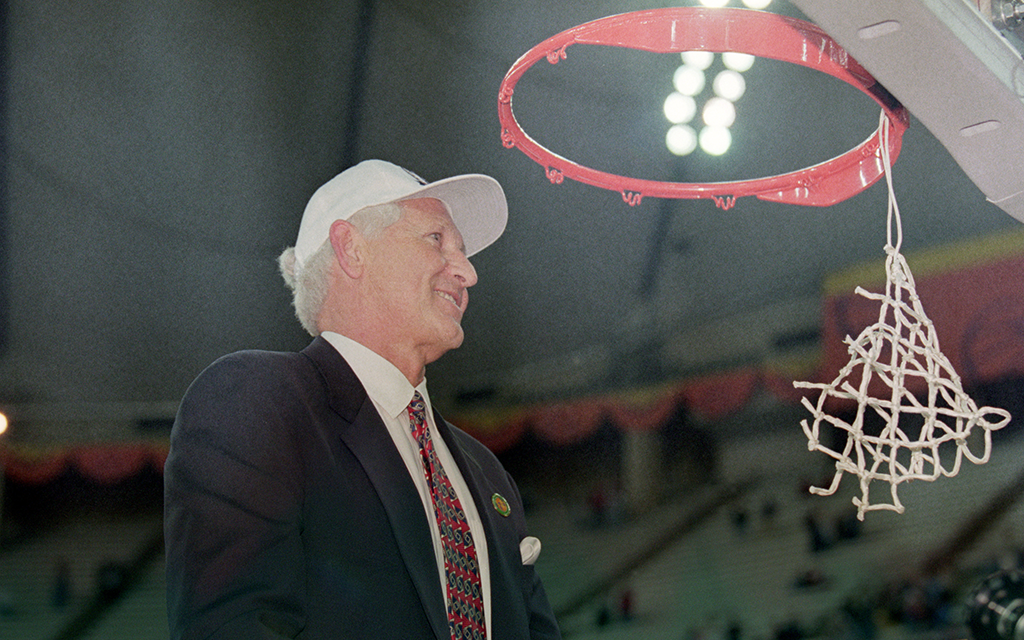PHOENIX – Twenty-seven years after the University of Arizona surprised the men’s college basketball world by taking home the 1997 title, the team’s former players still feel they don’t quite receive the recognition they deserve. Led by a group of almost all underclassmen, the Wildcats fought through their relative inexperience to win the 1997 championship.
“We’re the only team to ever beat three number one (seeds),” Miles Simon, a junior guard on the team and current Phoenix Suns assistant coach. “It’s never been done before and might not ever be done again. But this type of stuff is embedded in my mind forever.”
Though Arizona is called the Wildcats, they were certainly underdogs in the tournament. While they came into the tournament seeded fourth, national doubt surrounded whether the Wildcats could make the Final Four after being ranked just 15th in the country and losing their last two games of the season.
“We were going in there and nobody thought we were going to do anything,” said Josh Pastner, a walk-on freshman guard for the team.
In previous years, the Wildcats squandered successful seasons with early tournament exits, and it appeared they were in line for further disappointment. They trailed by double digits late before eking out a victory over South Alabama, then endured another scare against College of Charleston in the second round before freshman guard Mike Bibby saved the day. Next up was a bout against a No. 1-seeded Kansas.
“We had (South Alabama), then we had College of Charleston, which were very low-ranked teams,” former Wildcats forward Bennett Davison said. “And they gave us a tough time, like, ‘Holy crap, we had a tough time with these guys, how are we gonna be able to match up with Kansas?’”
Kansas, a top seed in the tournament, featured four players who had at least 10-year NBA careers: eventual Hall of Fame small forward Paul Pierce, power forward Raef LaFrentz, center Scot Pollard and point guard Jacque Vaughn. While Arizona featured plenty of future professional talent of its own, they were undersized against Kansas’ frontcourt.
Pastner wouldn’t play a single second against Kansas, but the walk-on freshman’s presence proved to be pivotal in their 85-82 win and Arizona’s entire championship run. Pastner both played for and coached his Houston Hoops AAU team in high school. Not receiving any scholarships to play basketball, he wrote to over 1,000 college basketball programs.
One of the only programs to write Pastner back was Lute Olson’s Wildcats, and Pastner made the team as a walk-on. Despite seldom receiving playing time, he quickly became a favorite amongst teammates for his infectious personality.
“There’s so much in the power of positive thinking,” Davison said about Pastner. “We go to school, we’d have practice, we’d have study hall, and then Josh would say, ‘Hey, I’m going to be at the gym at eight o’clock, do you want to shoot from eight to 10 o’clock?”
Pastner provided an excellent bridge between players and coaches, his experience on both sides of the ball playing a large role in that.
“I was trying to be extremely enthusiastic, positive, an energy giver, always engaged,” Pastner said of his role on the team. “(I was) a great resource, a guy that would be with you in the gym until midnight if needed to rebound for you, do whatever was needed to do to try to help guys be better and help Arizona win. My coaching spirit allowed me to accept my role and be comfortable in it.”
Of course every team believes it can win a title, but beating Kansas in the Sweet 16 was the kickstart the team needed to truly realize a championship was within reach, according to Steve Rivera who has written six books about Arizona basketball and covered Wildcats basketball for 33 years, including in 1997.
“They played out of their minds and played really well against Kansas,” Rivera said. “Very cool under pressure, you can kind of sense that maybe they have something here, and they were playing with a chip on their shoulder.”

Caption: Under Lute Olson’s guidance, the Arizona Wildcats defied the odds during a remarkable NCAA Tournament run and clinched the 1997 national title. (Photo by Brian Bahr/Getty Images)
One way the Wildcats defeated sizable opponents was their speed and versatility. The team had just two players taller than 6-foot-9 at a time when big men traditionally dominated the college game. The Wildcats emphasized guard play, frenetic defense to force turnovers and pushed the pace to tire out taller, more lumbering teams. This style of play has since become the norm among all levels of basketball.
“We were constantly pressuring, we were able to run circles around these guys,” Davison said. “A lot of good defensive strategy and everyone stuck to it. We were definitely smaller, younger, but we were quicker. Everybody had big hearts in how they wanted to play.”
Added Pastner: “We rarely ran a lot of set plays, it was very motion-oriented. And in the way we played with curls, curl cuts, screens and re-screens, flare screens, (what) you would see today is kind of what we were doing back then in 1997.”
The Elite 8 pitted the Wildcats against the Providence Friars. After Providence’s God Shammgod and Corey Wright missed game-winning shots in regulation, Arizona would prevail 96-92 in overtime. Facing them at the Final Four in Indianapolis was a date with another No. 1 seed, the University of North Carolina.
“(As a kid) I loved watching North Carolina and Georgetown and Kansas and all these other schools in the Final Four,” Simon said. “And now I got to live that.”
Earlier in the season, Arizona had defeated the Tar Heels 83-72 at the Hall of Fame Tip-Off Classic in the first game of the season. The Wildcats played without Simon for the matchup, but felt even more confident they could get a win, even if others didn’t believe they could, at full strength in the tournament.
Competing against another future Hall of Famer in Vince Carter and forward Antawn Jamison, who scored more than 20,000 points in the NBA, Arizona once again proved its mettle. They nursed a lead hovering around 10 points for most of the second half and had advanced to the championship game behind a 24-point outing from Simon and a 20-point performance from Bibby.
Now, against another one-seed in the Kentucky Wildcats, it was do or die. No more basketball to be played after this game.
“Either I’m going to bow down and take this, or I’m going to fight back,” Davison said of going into the final game of the season. “I’m going to fight back because this is my last ditch effort. That fight or flight kicks in, but you use a basketball to do that.”
But were they nervous? Of course not. In fact, they were so loose that the night before the game there was a food fight at the team hotel.
“It was probably just me and Josh Pastner, Jason Stewart, throwing little calamaris at each other,” Davison remembered. “All of a sudden coach Rosborough stands up, he’s like, ‘Hey, should I go stop them,’ and coach (Olson) says, ‘No, just let them be kids. Let us deal with all the pressure and not have them think about that stuff.’”
Just as they had throughout the tournament, the Wildcats overcame their lack of size by being speedier, wilder, quicker. It was a tightly contested affair throughout; neither team led by more than six at any point in the night. Once again, Simon and Bibby led the team with 30 and 19 points apiece, respectively.
In another overtime thriller, Arizona wouldn’t hit a field goal, but did make 10 free throws. As the buzzer sounded, a celebration ensued. Simon fell to the hardwood, the ball wrapped in his arms. Olson finally got his championship after years of disappointment in March. The Wildcats had managed to escape March Madness with a 6-0 record and an average margin of victory of just 5.3 points, including two overtime victories.
“Bennett Davison, of course, he’s the goofball of our group to mess up Coach Olson’s perfectly cut hair that was never out of place,” Simon said.
The idea to rustle with Olson’s hair was actually Pastner’s, but worrying about the off chance he’d face some discipline as a walk-on, he entrusted Davison to do his dirty work.
“It should be an NCAA thing, instead of throwing Gatorade on the coach, mess (the coach’s) hair,” Davison joked.
The celebration continued in Indianapolis as the team headed to Steak ‘n Shake for a feast fit for champions.
“My dad drove me, Eugene Edgerson and Mike Bibby to Steak ‘n Shake,” Pastner said. “My dad had a Rent-A-Car, took us three, and dropped us off.”
The Wildcats won on a Monday night, and by Tuesday they were back in Tucson with fans cheering their names and congratulating them for a once-in-a-lifetime achievement as the Wildcats paraded from the airport to the football stadium. All these years later, it’s still incredible to the team when fans remind them of the 1997 title.
“People, they always say they always remember where they were when it happened, and that stuff doesn’t go unnoticed,” Simon, who won the Final Four Most Outstanding Player Award, said. “And people will tell me those stories and I love listening to it because it means a lot to so many different people.”
On that Wednesday, less than 48 hours after reaching the pinnacle of the college basketball world, the team was back in the rec center playing pickup basketball with each other, five on five, preparing to win it again the following year. That’s just who this team was, and how dedicated they were to the game.
“It’s the greatest tournament run in the history of the NCAA Tournament,” Pastner said. “There should be an ESPN 30 for 30 film made on that team.”
